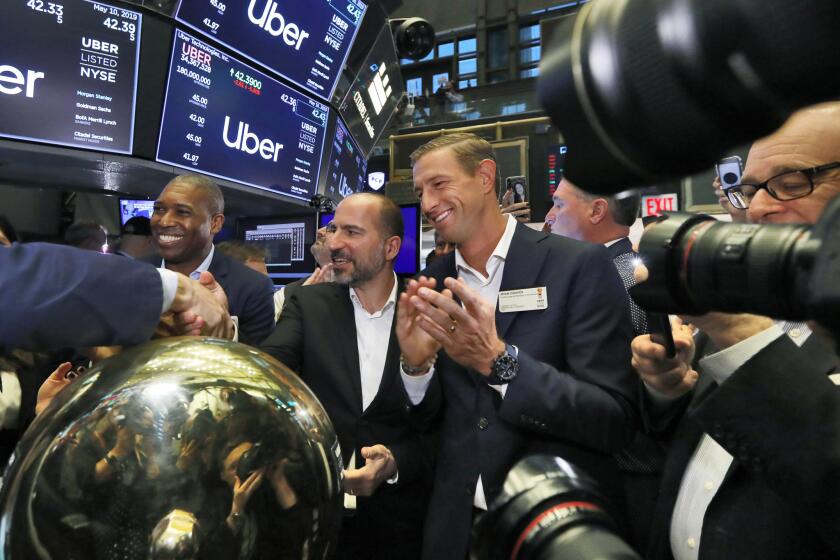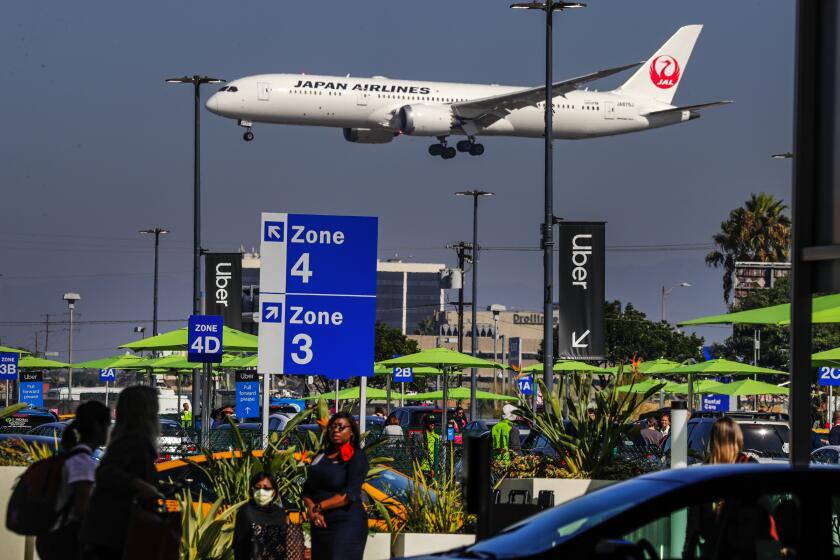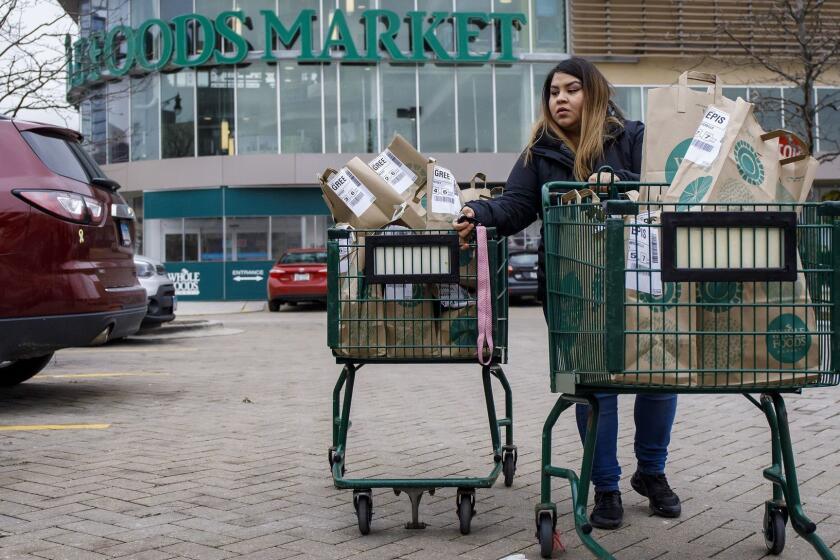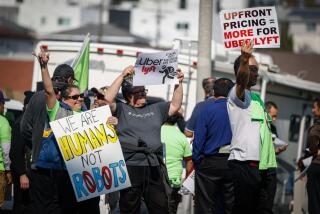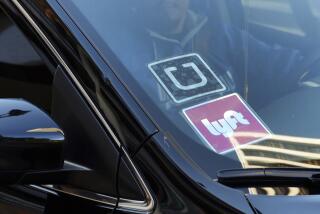Column: Uber reneges on the ‘flexibility’ it gave drivers to win their support for Proposition 22
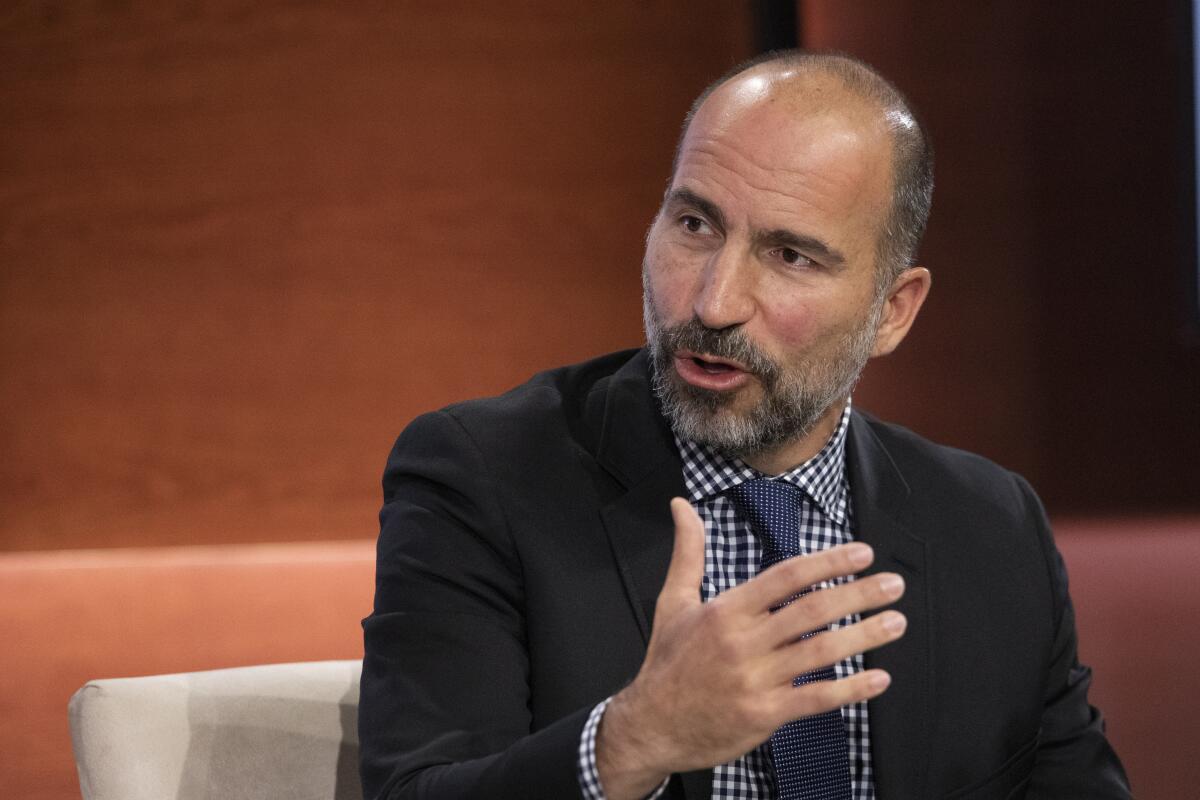
Last year, the ride-hailing service Uber gave its drivers unprecedented control over their fares and working conditions.
The goal was to win drivers’ support for Proposition 22, through which Uber and other gig companies aimed to rewrite California labor law in the companies’ favor.
The firms’ pitch was that the ballot measure would preserve the “flexibility” in hours and earnings that their workers valued, and that they said would be threatened unless the labor law was changed.
A lot of drivers were very gung-ho about Prop 22. Now they feel completely deceived.
— Tonje Ettesvoll, Uber driver
Uber’s new options seemed to make that flexibility more real: The company gave drivers more latitude to set their own fares, and more visibility into the trips they were offered before deciding whether to accept them.
Proposition 22 was passed by an overwhelming margin in the November election. Since then, some drivers say, Uber has taken the flexibility options away, and even cut the drivers’ income on many trips.
Get the latest from Michael Hiltzik
Commentary on economics and more from a Pulitzer Prize winner.
You may occasionally receive promotional content from the Los Angeles Times.
“A lot of drivers were very gung-ho about Proposition 22,” says Tonje Ettesvoll, who has driven for Uber in San Diego for five years. “Now they feel completely deceived. A storm is coming.”
Uber says it removed the flexibility options because they led to drivers refusing more trips, which lengthened riders’ waiting time and prompted would-be riders to cancel their requests.
“Pickup times for drivers in California have increased 56%,” the company told me by email. Ending the drivers’ ability to set their own fares “is designed to resolve that issue.”
The discontent over Uber’s practices has erupted just as the company and its fellow gig operators are trying to replicate their Proposition 22 success elsewhere in the U.S.
It also comes as the chief executives of Uber and Lyft are expressing concern that too few drivers are coming back on the road as the pandemic eases and passenger volumes pick up, resulting in longer wait times for passengers and more discontent.
“We have not seen drivers supply keep up with the demand growth in the U.S.,” Uber CEO Dara Khosrowshahi said this week at a JPMorgan investors’ conference, calling the issue “something we’re still working on.”
Proposition 22 is a revolutionary step in the influence of tech-based businesses in our daily lives in general and the lives of workers in particular.
Lyft executives raised the same alarm during a Wall Street conference call after the firm released its first-quarter financial results on May 4.
Driver advocates have greeted these remarks skeptically, noting that the firms could attract more drivers quickly by improving their pay.
“Dara is whining about a lack of drivers, but he controls what we’re paid,” says Nicole Moore, a board member of Rideshare Drivers United, a Los Angeles-based drivers association. “He has the ability to move the dial and put a lot more drivers on the street.”
At issue nationwide is the distinction between employees and independent contractors.
Businesses must grant numerous benefits to the first group, including government-designated minimum wages and limits on hours without overtime pay; unemployment and workers’ compensation benefits; the right to organize and affiliate with unions; and reimbursement for job-related expenses.
In most cases, independent contractors don’t receive those benefits. They negotiate individually over pay and working conditions and cover their own expenses.
Workers at Uber and other gig companies typically perform work that would normally be considered that of employees — it’s central to the companies’ business models, performed to standards the companies set.
But when California codified labor rules to mandate that such workers receive all the benefits of employees, Uber, Lyft and other gig companies drafted Proposition 22 to exempt their drivers, delivery workers and others from the employment rules and allow them to be classified as independent contractors.
After a campaign in which the companies spent more than $200 million, a national record for a ballot measure, Proposition 22 passed with nearly 60% of the vote.
“A huge part of their Proposition 22 campaign was to get the drivers on their side,” says Veena Dubal, a labor law expert at UC Hastings College of the Law and a critic of Uber and Lyft. “So they rolled out these things they knew that drivers would be excited about and would make them feel independent. And of course they’ve thrown them away.”
The independent contractor classification has come under fire from the Biden administration. “In a lot of cases gig workers should be classified as employees,” Labor Secretary Marty Walsh told Reuters in April. “These companies are making profits and revenue.... But we also want to make sure that success trickles down to the worker.”
(Actually, the major public gig companies are unprofitable, despite sticking their workers with expenses. Uber lost $6.8 billion on revenue of $11.1 billion last year, and Lyft, which is less than one-fifth Uber’s size, lost $1.75 billion on revenue of $2.36 billion.)
The ballot box campaign funded by Uber and Lyft is harassing a California law professor.
Early in May, the agency revoked a Trump administration rule that would have allowed gig companies more latitude to classify their workers as independent contractors. The rule had been announced just before Trump left office, and never went into effect.
The agency’s acting wage and hour regulator, Jessica Looman, said in connection with the revocation that “misclassification of employees as independent contractors presents one of the most serious problems facing workers today.... We are committed to continuing to combat misclassification, and we’re particularly focused in sectors where we know workers are vulnerable and violations are rampant.”
Looman didn’t identify those sectors, but Uber is among the largest, if not the largest, employers of “independent contractors.”
Biden is expected to nominate David Weil, who was chief of the wage and hour division under President Obama, to resume his old job. Weil has been a persistent critic of the gig companies’ business model. “Uber and Lyft are clearly employers,” Weil, then at Brandeis University, wrote in a 2019 op-ed in The Times.
If required to classify their drivers as employees, Weil wrote, “they would have to figure out how to comply with workplace laws like the minimum wage, provide certain baseline protections like unemployment insurance and workers’ compensation, and collect and pay state and federal payroll taxes. In other words, they would have to do what millions of other businesses do every day.”
Since the November election, the firms have been negotiating with state legislators in New York to promote a bill that would grant gig workers the right to organize and join unions, allow them to engage in collective bargaining with the gig industry and render them eligible for unemployment insurance and workers’ compensation. But the measure would stop short of granting the workers full rights as employees.
Support for the bill has been waning since organized labor took a closer look at its terms. They discovered that it would bar workers from striking or taking any other job action and forbid local governments from imposing a minimum wage for gig workers.
Uber and Lyft are being squeezed by enforcement of California’s gig worker law.
Opponents of the measure say that would undermine gains that workers have already won, including a minimum wage and unemployment benefits in New York City. The bill has already lost the support of the state Transport Workers Union and the Service Employees International Union.
“The bill reads like Uber’s fantasy novel — they get everything they want: ultimate deregulation, a phony union to give them cover, and workers at their mercy with no labor law or right to strike to build their power,” Bhairavi Desai, executive director of the Taxi Workers Alliance, told The City, a local news website in New York. The alliance represents taxi and gig-firm drivers.
That brings us back to Proposition 22. Uber, Lyft and the delivery firms DoorDash and Instacart asserted that mandating that they classify their drivers and deliverers as employees would force them to deprive the workers of the “flexibility” to set their own work schedules to fit their calendars and maximize their earnings.
Uber made that argument concrete by giving its drivers the ability to be more selective about rides. Drivers start their work hours by signing on to Uber’s smartphone app and waiting to be matched with passengers seeking rides via the app.
The options implemented during the Proposition 22 campaign included one allowing drivers to set multiples of Uber’s base fairs as the minimum they would accept, up to five times the base. They understood that the higher the multiple, the fewer ride opportunities they might be offered, but those would be more likely to be profitable.
Another feature told drivers the destination of every offered ride and an estimated fare. That allowed drivers to judge how long they’d be tied up on a ride and where they would end up — including the prospect of finding a passenger for a return trip.
“You could tell if your three-hour wait at the airport would give you a three-minute ride or a 40-minute ride,” Moore told me.
When it comes to exploiting its front-line workers, the grocery delivery service Instacart may be in a class by itself.
Over the last month or so, however, both features have been removed. Drivers can still see their passengers’ destinations before accepting a ride, but only if they have accepted five rides out of the last 10 offered.
Uber also has sharply cut drivers’ pay for trips originating at Los Angeles International, San Francisco and San Diego airports. At LAX and San Diego, drivers say, they now receive 32 cents per mile, regardless of the distance traveled.
That’s down from about 60 cents before the passage of Proposition 22, drivers say. It’s also well below the 56 cents per mile that the Internal Revenue Service has set as the deductible cost of ownership of cars driven for business use, counting fuel, maintenance, insurance and wear and tear.
Uber told me the fare reduction was aimed at making short- and medium-distance trips more consistent, and resultantly the queue moves faster and all drivers see shorter wait times.
Drivers have also discovered that some benefits written into Proposition 22, such as subsidies for health insurance and guaranteed minimum wages, haven’t been as valuable as they may have appeared at first.
To obtain the full subsidy for health insurance, which is pegged to 82% of the premium for the lowest-rated bronze Obamacare plan in California, or $409 per month, drivers have to log an average of 25 hours of active driving (not counting waiting time) per week. That can be a high bar, and is likely to become more difficult as more drivers return to work, producing more competition for passengers.
“It’s doable now, but when everybody comes back on the road it won’t be,” says Ben Valdez, a six-year veteran of driving for Uber and Lyft. Drivers on Medicaid or Medicare or receiving coverage from spouses or other family members aren’t eligible for the subsidy at all.
Valdez, who is associated with Rideshare Drivers United, says that disappointment in the realities of Proposition 22 was inevitable.
“The expectation was that the way the companies wrote the law, they would make sure they’d have to pay the least amount of money for anything they did,” he says.
Through Proposition 22, he says, “Uber and Lyft legally made us independent contractors, and allowed themselves to change the system any way they want, to treat us as employees without paying us as employees.”
More to Read
Get the latest from Michael Hiltzik
Commentary on economics and more from a Pulitzer Prize winner.
You may occasionally receive promotional content from the Los Angeles Times.
